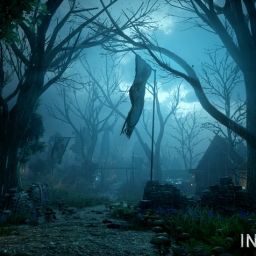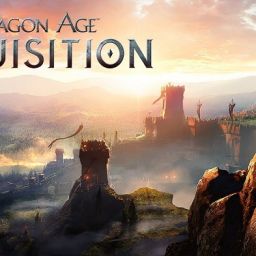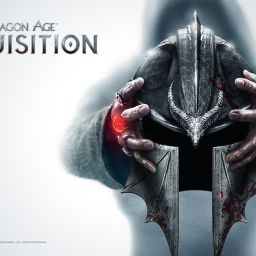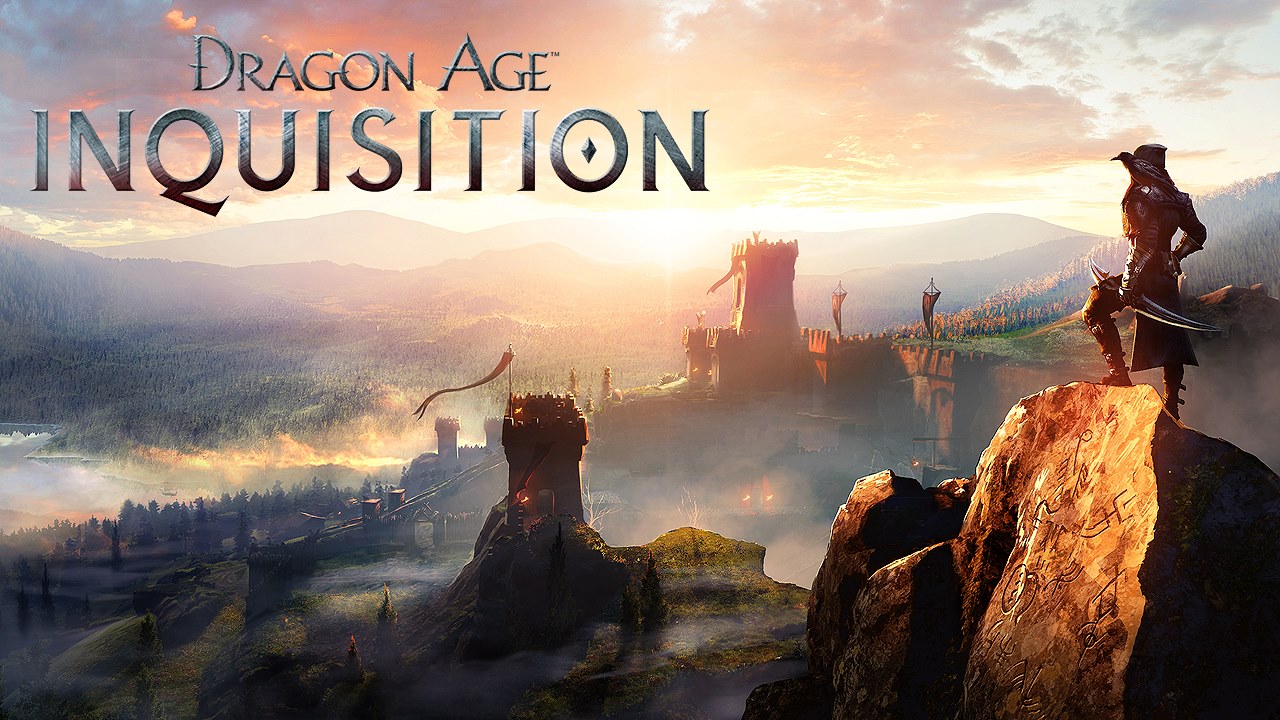So I’ve now reached that part of any game affectionately known as “grinding.” Except in DAI I really am not minding it all that much. It’s nice that a lot of my quests aren’t “fetching” anymore (there were several in the Hinterlands, but the number of “fetch it” quests proportional to “kill it” quests has gone down). There are a lot of “find it” (which is different from “fetch it” in that I don’t have to then report back to anyone, I just have to collect lots of things) quests, though. Astrariums, shards (that you have to find by staring through creepy skulls of dead Tranquil), mosaic pieces, tomes, letters, herbs, metals, yadda yadda. LOTS of collecting.
Up side, some of these things can be used to improve Skyhold, others to make my armor or weapons better, and some of them just become decorations (like beds and drapery and banners). I have Inquisitorial stained glass windows, a Free Marches bed, some Qunari drapes, and banners from all the places (I put up the Inquisition ones). I’m not really sure why, since there seems to be no concerted difference between them other than appearance, but okay. Whatever.
I’ve done a lot more crafting of armor recently, and started doing some weapons. The crafting system reminds me a lot of Skyrim. I like it, but I also like the idea of just being able to find or buy what I want rather than having to take the time to make it, find runes, etc. But since I could conceivably go through the game without making anything if I didn’t want to, I guess I can live with that. Although then I wouldn’t get to have slightly weird conversations with Dagna, the Archanist (who was a character WAY back in DAO – a dwarf who desperately wanted to study magic, even though dwarves can’t be mages). She’s kinda awesome – a nerdy academic type who could probably also kick your ass if she was of a mind to. My kinda girl.
In addition, I’m starting now to get “loyalty” quests from my NPCCs (although I’m not sure there are loyalty missions in the same way that there were in DA2 or even ME2), and have gotten to do things like decide whether Sera gets to beat an idiot noble to death (yes), help Dorian confront his ass-hat of a father (who apparently tried to un-gay his son through blood magic, because that’s not creepy and assholish), kill some Vinatori for Dorian, kill some Templars for Cassandra, destroy some red lyrium for Varric, save a spirit for Solas, find some Warden artifacts for Blackwall, find some books for Vivienne… I haven’t had to do anything yet for Iron Bull other than get drunk, but that was kinda fun.
This is also where the player’s romance choices become more important. Not set in stone yet, I don’t think, but this is the point in the game where the Inquisitor can “go all the way” with the love-interest of his or her choice. So now it’s time for my digression on diversity and sexual preference. BioWare games are notorious for permitting and even encouraging different kinds of sexuality. Many of the NPCCs in DA2 were anything-goes kinds of characters (Fenris, Isabela, Anders, and Merrill), with Sebastian and Aveline being the only straight-exclusive NPCCs (the sibling Carver/Bethany is a sibling and therefore not an option and Varric is not a romance option).
In DAI the NPCCs and Advisors (two of whom are also romance-able options) are much pickier. Solas and Cullen are the most selective, with Solas only liking elven women and Cullen only elven and human women. Sera and Blackwall can be romanced by any female, Cassandra and Dorian by any male, and Josephine and Iron Bull are open to being romanced by any gender or species. Varric, again, is not a romantic option, and neither are Leliana, Cole, or Vivienne. (A more complete explanation.)
Khaaras is a male Qunari, which means that my options – should I decide to pursue one – are Cassandra, Dorian, Josephine, and Iron Bull. Josephine is an advisor, which means that she doesn’t generally accompany the Inquisitor on missions (except for the ones directly involving her family, but she doesn’t fight), so romancing her would eliminate the potential entertainment value of NPCC conversations involving her as a romantic subject. One of the fun things about BioWare games is that the NPCCs have conversations about whatever else is going on – and are specific to each NPCC’s personality. So if the Inquisitor has a flirtation or relationship (or more than one), those things come up in conversation.
For instance, Khaaras is romancing Dorian, and Cassandra at one point made a snarky comment about how Dorian has been staring off into space dreamily a lot. The Inquisitor’s choice of romance companion can also impact NPCs – Mother Giselle does not approve of Dorian because he’s Tevinter (lots of people don’t like that he’s from Tevinter, including Cassandra and Vivienne), and will confront him about getting “too close” to the Inquisitor, who can choose to intervene or not in their argument.
Romance options are one of the big draws for BioWare games, although they have also gotten the company a lot of blow-back from people who are upset about the possibility of homo- or bi-sexual relationships in the game. One particularly notable commenter on the DA2 forums was upset that a male NPCC could flirt with his character. At one point, there was discussion about the inclusion of a “sexuality toggle” in DAI. David Gaider, one of the lead writers for BioWare, shut that down pretty quickly:
when it comes to content options like the so-called ‘gay toggle’ …my question would be ‘why?’ We don’t allow the player to de-select other sorts of content. A ‘violence’ toggle? A ‘mention of slavery’ toggle? A ‘sexual situations’ toggle? Why would we have a ‘gay’ toggle? Even if that was just to set the player’s personal preference, and we didn’t think that was incredibly on-the-nose to put up front, would de-selecting the ‘gay’ toggle mean a player should expect to encounter no gay characters? Ever? You don’t think there are those who would interpret it as exactly that?
Gaider’s response encapsulates one of the core things about BioWare games that really makes me love them: they’re about what we do encounter, the people and things we really have to deal with, not just the things we want to deal with. On a day-to-day basis, we talk to people who don’t agree with us, whose lives are different from ours, whose origins lead us to stereotypical conclusions that may or may not be accurate (and usually aren’t). BioWare games ask us to do this – make the hard choices, decide between “friends” who have different goals and opinions. To decide whether to be “friends” with them at all (since the player can decide not to recruit NPCCs or ask them to leave the Inquisition).
These things are also why the “grinding” part of BioWare games (with the notable exception of the Mako missions in Mass Effect) is often not as tedious as it is in other games. The “grinds” are companion quests, requests from people (NPCCs) the player has come to care about in some minor capacity within the context of the game, so it matters whether the Inquisitor fetches the Warden tokens or kills the Vinatori or destroys the red lyrium because the player likes Blackwall or Dorian or Varric and wants to increase their approval stats. The things we do in DAI matter – not just in terms of “winning” the game, but in terms of how the NPCs and NPCCs respond, and that makes the experience that much better in terms of immersion, but also that much more critical to the game’s purpose.
Now I haven’t finished (obviously) DAI just yet, so I don’t yet know what its critical thesis is, but I can guess based on DAO/A and DA2, and the NPCCs in all three games function with similar mechanics. They’re there not just to make the player feel good about his or her choices by being “yes-men”; in fact, the characters often disapprove of things the player might choose to do. For instance, Vivienne hates most of my choices, but I’m okay with that. I think she’s self-serving and patronizing and while she has some valid points (I’m still going to find her books for her, since learning and not getting possessed by demons are good things), I don’t like her dismissal of the importance of things like freedom and choice. To put it simply, I don’t like Vivienne, and I’m not terribly concerned whether she approves of my actions or not.
I do like Varric and what he stands for. I like Cassandra even though she’s a little rigid (although there’s a hysterical romance-novel sub-quest for her that shows she’s not as rigid as she likes to pretend). I like Dorian and the fact that he’s willing to give up on everything he knew just to help the cause. I’m warming up to Sera and Iron Bull and Solas, who are all a little at odds with my ideology (as Inquisitor), but ultimately well-meaning. I don’t really care much about Blackwall, but I generally agree with his politics, so I’m okay making him happy.
And that’s what life is like. We like some people, we don’t like others, and we make choices based on politics and personality more than on abstract notions of whether or not someone is “useful” to us. And that’s one of the things that BioWare games are driving at. That people matter – they aren’t just statistics, they’re people, and we make choices about our ideologies based in part on what we think of the people associated with them – which is an important thing to recognize.
So back to the grind, because it’s the little things that matter to people most.








[…] Inquisition As-I-Play is up over on TLF, this one talking (appropriately, given my last post) about sexuality in BioWare games and why it […]